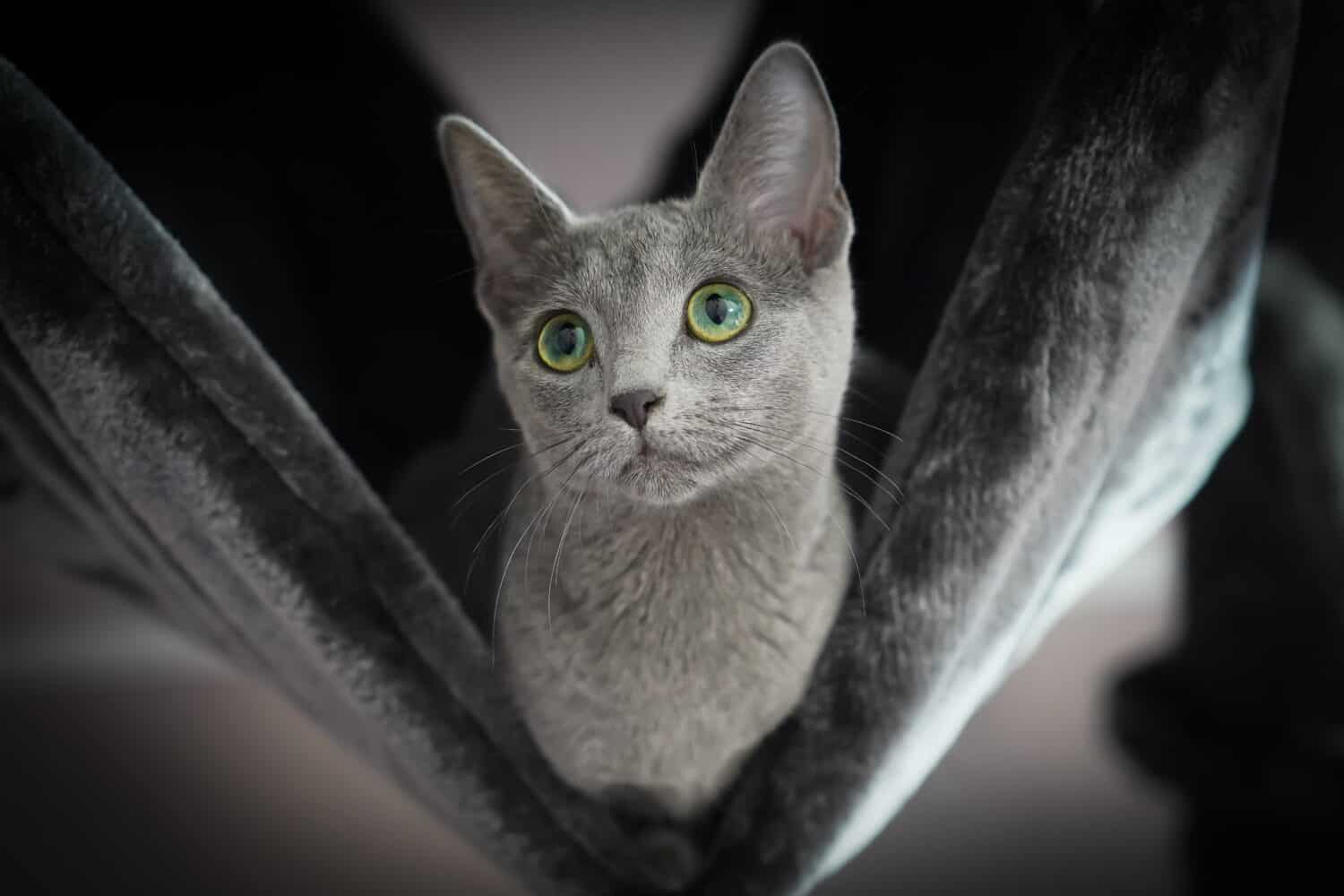The choice between indoor and outdoor cats is a common dilemma. Indoor cats relish the comfort and safety of their cozy home, while outdoor cats get to embrace their adventurous spirit. In this article, you will discover the benefits and downsides of having indoor or outdoor cats. With a fuller picture, you’ll be able to make a better-informed decision for your beloved feline friend.
Indoor vs. Outdoor Cats: The Differences
The primary distinction lies in the contrasting lifestyles of indoor and outdoor cats. While an indoor feline comfortably resides within the confines of your home, an outdoor counterpart can either freely roam between the indoors and outdoors or opt for a completely outdoor lifestyle.
Indoor Cats
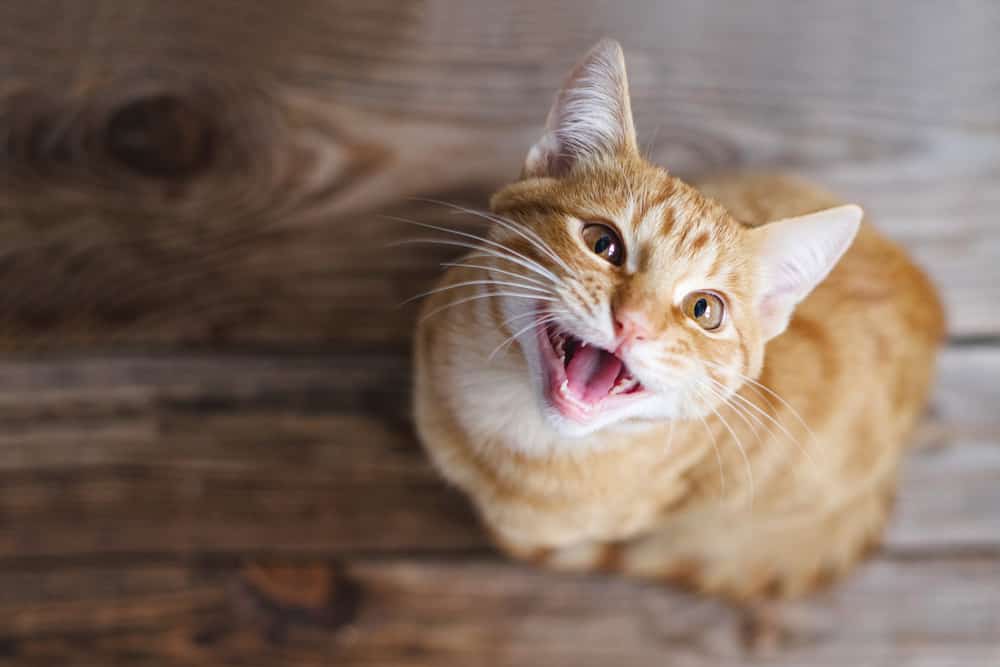
Indoor cats have a much longer lifespan, living up to 20 years in some cases.
©savitskaya iryna/Shutterstock.com
Let’s start with the advantages and potential drawbacks of keeping a cat exclusively indoors.
Pros
Here are a few benefits of cats staying indoors.
Longer Lifespan
Indoor cats have the advantage of a longer lifespan, which means more quality years spent with their owners. By staying indoors, they avoid potential accidents and the dangers lurking outside that could affect their health and well-being.
Reduced Risk of Accidents and Injuries
By limiting their outdoor adventures, indoor cats are shielded from potential accidents like traffic-related mishaps, falls, or encounters with aggressive animals, ensuring a safer and more secure lifestyle.
Minimal Exposure to Parasites and Pests
Keeping your cats indoors is a smart way to protect them from troublesome parasites like fleas and ticks. By minimizing their exposure to these pests, you greatly decrease the risk of infestations and the potential health problems they can bring.
Reduced Chances of Getting Lost or Stolen
Indoor cats have a significantly lower risk of becoming lost or stolen, providing peace of mind for owners and ensuring the beloved feline remains safe within the confines of their home.
Decreased Potential for Fights with Other Animals
By residing indoors, cats avoid potential altercations with other animals, reducing the risk of fights that could result in injuries or the transmission of diseases.
Reduced Impact on Local Wildlife
Indoor cats have a minimal impact on local wildlife populations since they do not hunt or disturb the natural ecosystem, helping to maintain the balance and harmony of the environment.
Fewer Allergens and Allergenic Reactions
Keeping cats indoors can be beneficial for individuals with allergies, as it limits exposure to allergens such as dander, reducing the frequency and severity of allergic reactions.
Easier Monitoring of Diet and Weight Control
Indoor cats’ diets can be more easily controlled and monitored, allowing for precise portion sizes and specialized diets when needed, which helps to maintain a healthy weight and prevent obesity-related health issues.
Less Exposure to Extreme Weather Conditions
Indoor cats enjoy the luxury of being shielded from extreme weather conditions like scorching heat waves, freezing temperatures, or turbulent storms. This cozy shelter ensures their comfort and well-being all year round, allowing them to relax and stay safe while nature’s elements rage outside.
Reduced Grooming and Maintenance Requirements
Indoor cats tend to require less grooming and maintenance compared to their outdoor counterparts, as they are less likely to get dirty or tangled in outdoor elements.
Enhanced Home Cleanliness and Hygiene
Keeping cats indoors helps maintain a cleaner and more hygienic living environment, as it reduces the risk of tracking dirt, debris, or outdoor pests into the house.
Reduced Risk of Ingesting Toxic Substances or Plants
One of the key advantages of keeping cats indoors is the decreased likelihood of them accidentally consuming toxic substances or harmful plants that could jeopardize their health.
Cons
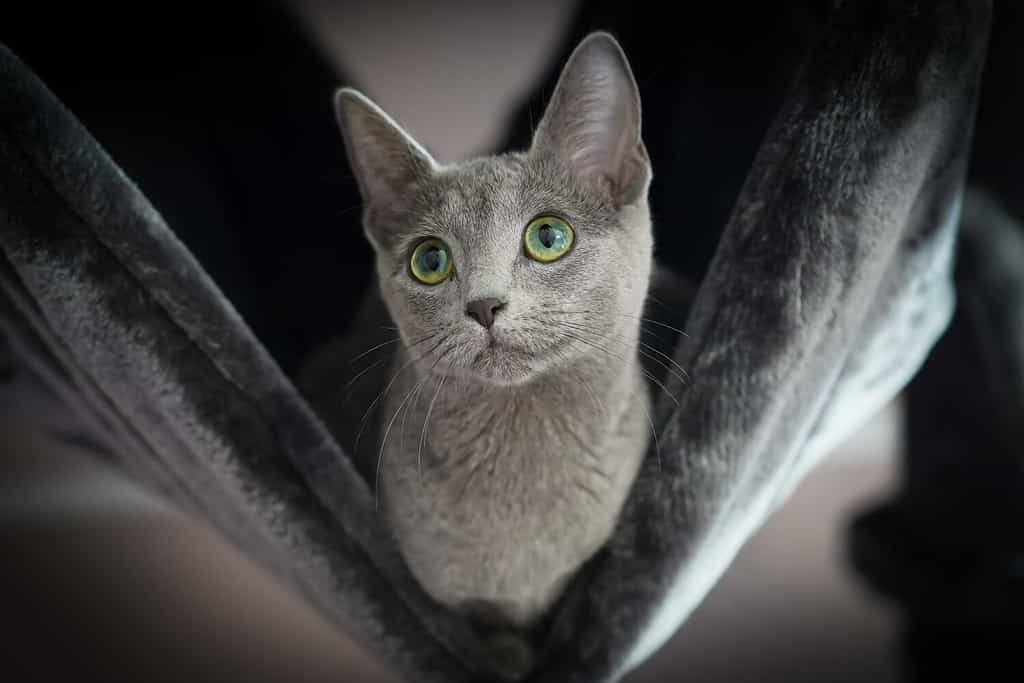
Indoor cats can lead to obesity and vitamin D deficiency.
©Michael Kalinin/Shutterstock.com
While keeping cats indoors offers numerous advantages, it’s important to be aware of the potential drawbacks associated with this lifestyle.
Potential for Behavioral Issues
The absence of outdoor exploration and stimulation may result in the development of behavioral issues like excessive meowing or destructive behavior. Indoor cats may also experience stress due to confinement and limited environmental stimulation, which can manifest in behaviors like aggression.
Increased Risk of Obesity and Related Health Problems
Without ample exercise and limited space for movement, indoor cats are at a higher risk of obesity and associated health complications. So, monitoring their diet, providing balanced nutrition, and engaging in interactive play to encourage physical activity are essential for maintaining a healthy weight.
Limited Exposure to Natural Sunlight and Fresh Air
Indoor cats miss out on the benefits of natural sunlight and fresh air, which can impact their overall well-being. Allowing access to sunny windowsills or providing safe outdoor enclosures can help cats experience the positive effects of the outdoors.
Potential for Vitamin D Deficiency
The lack of exposure to sunlight can result in vitamin D deficiency in indoor cats. Incorporating vitamin D supplements or offering UVB lamps specifically designed for feline use can help meet their vitamin D needs.
Increased Likelihood of Urinary Tract Problems
Limited physical activity and reduced water intake can contribute to an increased risk of urinary tract problems in indoor cats. Encouraging hydration through multiple water sources and providing a stimulating environment to promote regular movement can help prevent such issues.
Potential for Decreased Muscle Tone and Strength
Limited physical activity indoors can result in decreased muscle tone and strength in cats. Engaging in regular play sessions, providing climbing structures, and incorporating exercise routines tailored for cats, for example, can help maintain their physical fitness.
Increased Risk of Dental Issues Without Regular Chewing
Indoor cats may have an increased risk of dental problems due to a lack of natural chewing on grass or other fibrous materials.
Limited Opportunities for Socialization with Other Animals
Cats that are solely indoors may have fewer chances to interact and socialize with other animals, potentially leading to a lack of social skills. Organized playdates with other cats or supervised encounters with well-socialized animals can help provide socialization opportunities.
Cats May Become Overly Dependent on Owner’s Attention
The absence of other sources of stimulation may result in some indoor cats becoming overly reliant on their owners for attention and interaction. This can be an issue if you are away and leave your cat alone for an extended period.
Outdoor Cats
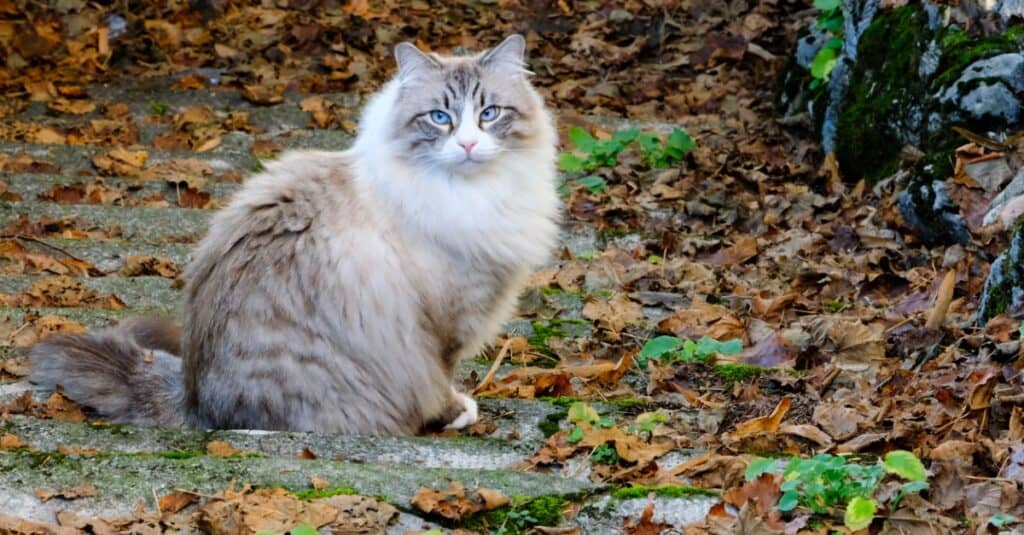
Some advantages of having an outdoor cat include fewer litter box messes and reduced boredom.
©iStock.com/Fabio Caironi
We have discussed the benefits and risks of indoor cats, and now it’s time to find out everything you need to know about owning outdoor cats.
Pros
First, we will look at the benefits of cats living outdoors.
Sense of Exploration and Adventure
When cats have the opportunity to venture outdoors, they can indulge their natural curiosity, discovering new sights, sounds, and scents. Exploring the world beyond four walls satisfies their innate sense of adventure and provides mental stimulation.
Fewer Litter Box Messes
By letting cats explore the outdoors, owners can reap the reward of fewer litter box messes inside the home. Outdoor excursions provide cats with alternative options for relieving themselves and reducing the mess of litter boxes.
Nurturing Hunting Skills and Instinctual Behaviors
The outdoor environment presents cats with a playground that ignites their hunting instincts. From stalking prey to pouncing and climbing trees, outdoor cats engage in activities that sharpen their hunting skills and provide an outlet for their innate behaviors.
Health Benefits of Outdoor Excursions
Breathing in the fresh air and soaking up natural sunlight offers numerous health advantages for cats. Exposure to vitamin D helps maintain strong bones and overall well-being, while the clean outdoor air contributes to better respiratory health.
Interactions with Other Animals
The great outdoors opens up a world of social interactions for cats. Whether it’s meeting fellow felines, encountering friendly dogs, or observing birds and squirrels, outdoor cats have the chance to broaden their social horizons and fulfill their need for companionship.
Keeping Cats Fit and Nimble
Outdoor exploration naturally provides cats with opportunities for physical exercise. Running, jumping, and climbing trees help maintain optimal muscle tone, promote cardiovascular health, and keep them agile and fit. Regular outdoor activity also aids in weight management, reducing the risk of obesity and its related health problems in cats.
Fulfilling Natural Needs
Outdoor excursions allow cats to establish and defend their territory, fulfilling their instinctual need for space and independence. For example, marking territory, patrolling, and engaging in natural behaviors promote a sense of security and ownership over their surroundings.
Reducing Boredom and Behavioral Issues
Outdoor exploration combats boredom and reduces the risk of behavioral problems. Of course, the ever-changing outdoor environment presents cats with endless stimuli, preventing monotony and encouraging mental engagement, resulting in happier and well-adjusted feline companions.
Nature as a Calming Oasis
Being in nature has a soothing effect on cats, helping to alleviate stress and anxiety. The serenity of natural surroundings, away from the confinement of indoor spaces, provides a calming retreat for cats to unwind.
Cons
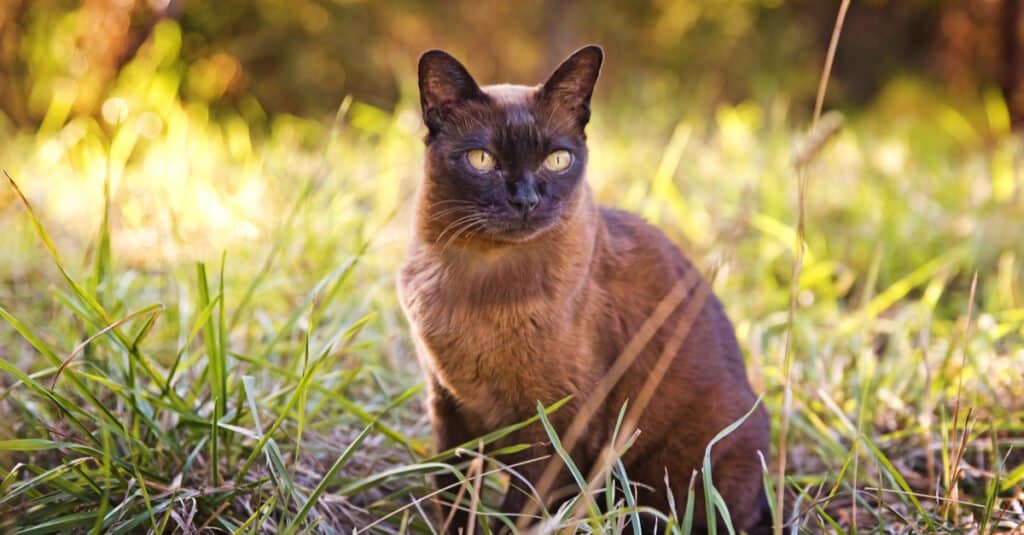
Unfortunately, there is an increased risk of accidents and injuries when it comes to outdoor cats.
©jojosmb/Shutterstock.com
Understanding the following potential risks associated with outdoor exploration for cats is crucial for ensuring their safety and well-being.
Increased Risk of Accidents and Injuries
Outdoor cats face a higher likelihood of accidents and injuries compared to their indoor counterparts. From falls and encounters with vehicles to mishaps while exploring unfamiliar territories, the outdoor environment exposes them to various risks that can lead to harm.
Exposure to Outdoor Hazards And Diseases
Venturing outdoors puts cats at risk of encountering hazards such as toxic plants, harmful chemicals, and other dangers lurking in the environment. Additionally, they face a greater chance of contracting diseases from exposure to infected animals or contaminated sources, heightening their vulnerability to health issues.
Shorter Lifespan and Poorer Overall Health
Unfortunately, outdoor cats face a significantly shorter lifespan than their indoor counterparts, with an average life expectancy ranging from just 2 to 5 years. While indoor cats can enjoy a life spanning 10 to 20 years, outdoor cats encounter substantial safety and health risks that tragically cut their lives short. The freedom of outdoor exploration comes at a high cost!
Higher Likelihood of Encountering Parasites and Pests
Outdoor cats have an increased risk of encountering parasites and pests like fleas, ticks, and worms, which can lead to infestations and related health problems. Regular preventative measures, such as parasite control treatments, become crucial to safeguard their well-being.
Increased Chances of Getting Lost or Stolen
There is a heightened risk of outdoor cats getting lost or, in unfortunate cases, being stolen. Their independent nature and territorial instincts may lead them to wander far from home, increasing the difficulty of finding their way back.
Potential for Fights with Other Animals
Interactions with other animals while outdoors can lead to territorial disputes and physical confrontations, resulting in injuries or the transmission of diseases. These encounters can be particularly common in areas with a high population of stray or feral cats.
Negative Impact on Local Wildlife
Outdoor cats that engage in hunting behaviors can have detrimental effects on local wildlife populations. Their predatory instincts and successful hunts contribute to the disruption of ecological balance, impacting native bird populations and other small animals in the area.
Higher Allergen Exposure and Allergenic Reactions
Outdoor cats bring a higher level of allergen exposure into the home environment. The outdoor elements they encounter, including pollens and outdoor allergens, can trigger allergic reactions in susceptible individuals, causing discomfort and potential health issues.
Difficulties in Monitoring Diet and Weight Control
The outdoor environment presents challenges in monitoring a cat’s diet and ensuring appropriate weight control. Access to alternative food sources, scavenging behaviors, and unpredictable eating patterns make it harder to regulate their nutrition, increasing the risk of obesity-related health problems.
Weakened Bond and Companionship with Owners
Outdoor cats may develop a more independent nature, potentially leading to a weakened bond and reduced companionship with their owners. Their increased exposure to the outside world and interactions with other animals can shift their focus away from the close relationship they once had with their human caregivers.
Increased Grooming Needs
The outdoor environment introduces more dirt, debris, and potential contaminants to a cat’s fur, resulting in increased grooming requirements. Therefore, regular grooming becomes essential to maintain their coat’s cleanliness, minimize the risk of infections, and remove parasites or foreign matter.
Increased Vet Bills
Unfortunately, the outdoor lifestyle exposes cats to a higher risk of accidents, injuries, and health issues, resulting in more frequent visits to the veterinarian. Furthermore, the associated veterinary costs, including treatments for injuries, vaccinations, and parasite control, can add financial strain to cat owners.
What’s Better? Indoor vs. Outdoor Cats

All things considered, keeping a cat indoors is better for the cat’s overall health and safety.
©Alexander Sobol/Shutterstock.com
Most consider keeping cats indoors to be the better option. By keeping them indoors, they’ll live much longer and will be exposed to much fewer risks! However, with that said, the well-being of our feline friends hinges on individual circumstances, so what you decide is entirely up to you. Owners should carefully consider all the factors involved in deciding whether to keep their cat indoors or allow outdoor access.
Summary of Indoor vs. Outdoor Cats
| Differences | Indoor Cats | Outdoor Cats |
|---|---|---|
| Lifespan | 10-20 years | 2-5 years |
| Exercise | Reduced opportunity for exercise | Increased mental and physical stimulation |
| Accidents | Lower risk of traffic-related accidents and decreased potential for fights with animals | Greater risk of traffic-related accidents and potential for fights with other animals |
| Impact on Wildlife | Reduced impact on local wildlife | Negative impact on local wildlife |
| Allergen | Fewer allergens and allergic reactions | Higher allergen exposure and allergenic reactions |
| Bond with Humans | Better bond with owners but can lead to them becoming overly dependent | Weakened bond and companionship with owners |
| Litter Box | Litter box needs to be cleaned often | Litter box is not used often if at all |
| Grooming | Fewer grooming needs | Increased grooming needs |
| Diet | Easier monitoring of diet and weight control, but can lead to obesity due to lack of exercise | Reduced risk of obesity and related health problems |
Thank you for reading! Have some feedback for us? Contact the AZ Animals editorial team.

